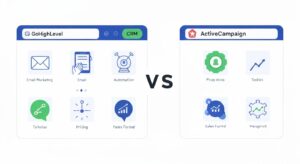Turning Missed Leads Into Revenue: The CRM Follow-Up Advantage

For many agencies, the biggest revenue leaks don’t happen because of poor campaigns or weak offers. They happen in the quiet moments after a lead comes in. A possible customer fills out a form, clicks on an ad, or replies to an email, but then… nothing. Follow-up is late, uneven, or just lost. That gap can mean the difference between getting a client and losing them to a rival in fields that change quickly.
Building a solid CRM follow up strategy that makes sure every lead is recognized, cared for, and led toward sales is the answer. When agencies follow up in a planned, timely, and human way, they can turn wasted chances into steady lines of income.
The Cost of Slow or Inconsistent Follow-Ups
Leads are quickly bored. A delayed answer makes people unsure, and when people are uncertain, they hesitate. Even a short lag can cause potential clients to move on, especially if competitors are faster and more organized. Many agencies underestimate how much business slips away simply because their follow-up process depends on manual effort or scattered reminders.
When each salesperson or account manager handles follow-ups differently, inconsistency compounds. Not every tip gets an answer right away, and some never do. There is confusion. This makes it hard to guess how much money will come in and make sure that the sales process is correct.
This can be fixed with an organized method that makes sure each lead gets professional care right away. It takes the place of chance with confidence.
Building Predictable Engagement
A good follow-up plan doesn’t depend on individual team members doing amazing things. Instead, it sets up a structure that makes it always clear what to do next. When someone asks a question, an automated response goes out right away. Reminders set up ahead of time help team members get in touch with each other at the right times. Sequences are made to get people interested again after they lose interest at first, without being too much for them.
When these steps are built into the CRM, they don’t stand out. You don’t have to keep track of leads by hand or use your own schedules. There is a set path for each prospect to follow, so no chance is lost. When you’re this stable, people are more likely to believe you, which means you’ll have more important conversations that lead to sales.
Nurturing Beyond the First Touch
Many leads don’t become buyers the first time you talk to them. They may need more information, more time, or more proof that your company is the right one for them. Knowing this, a good CRM follow up strategy focuses on showing care rather than pushing.
You are a professional and someone who is paying attention if you follow up on time and with something important. Business can teach possible customers, ease their fears, and get to know them over time. The CRM keeps track of all the talks so the team can see what was talked about in each one. This connects the conversations instead of keeping them separate.
This kind of careful care not only makes clients better, it also gets more people to buy. Smarter, more interested leads who make it through a planned follow-up process are ready to build a long-term connection.
Turning Leads Into Revenue Predictably
If you want to make sure you always make money, having a steady follow-up plan is very helpful. When a business knows it can follow through on every idea, forecasting works better. When teams win more often, they have more time to close deals and less time to think about missed chances.
This well-thought-out method builds on itself over time. The follow-up process will help the office get bigger as it gets better. We can now measure it and do it over and over again, even though at first it seemed out of the blue.
Conclusion
It may not seem important, but follow-ups can make or break a business’s ability to make money. With a planned CRM follow up strategy, you can make sure that no leads are lost, but mistakes and delays can kill chances in the background.
People who are interested in someone once can become interested in talking to them again if follow-ups are added to the CRM and seen as an important part of the sales process. People will feel important right away, which will help you close the deal. This way builds trust, makes forecasts better, and turns missed chances into a steady source of growth over time.




